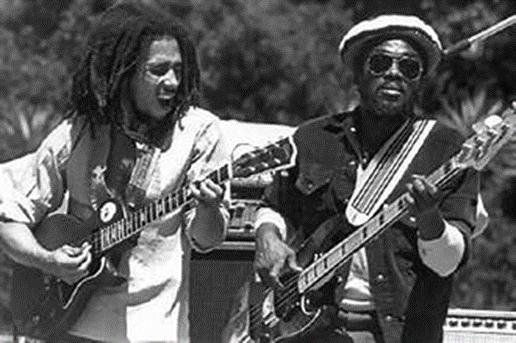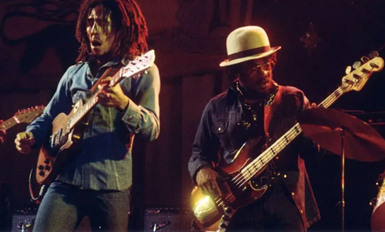Strictly Roots will celebrate the music of Bob Marley and Aston “Family Man” Barrett throughout February, airing features every Sunday, 6-8 p.m. Click here to listen live.
Marley — the most prolific and best-known musician and songwriter to come out of Jamaica — passed away in 1981 at 36. Bassist Martin, a key member of Marley’s backing band, the Wailers, died Feb. 3, 2024 at the age of 77.

Marley is considered a messenger who helped introduce reggae to the world, but was also an ambassador of peace and justice who frequently spoke out in support of social reforms.
He fueled the reggae explosion in the 70s and was a force to be reckoned with, not only at home, but abroad, as he embarked on sold-out stadium tours towards the end of that decade. He sold more than 75 million albums.
Marley’s musical career began when The Wailers were formed in 1963 with Neville O’Riley Livingston, known by his stage name, “Bunny Wailer” and guitarist/vocalist Peter McIntosh, soon known as Peter Tosh.
Their debut album, The Wailing Wailers in 1965 was produced by the legendary Clement Seymour “Coxsone” Dodd who put together 12 recordings the band did between 1964-65. It featured the lead single, “One Love” which included a re-working of Curtis Mayfield’s “People Get Ready.” It had been recorded by Mayfield’s group, The Impressions, in 1965. The single established the Wailers as rising figures in reggae.
After signing to Island Records and tours in support of two albums released in 1973 (Catch A Fire and Burnin’), the group catapulted to international attention and financial success.
Boosted by Eric Clapton covering “I Shot The Sheriff” on his 461 Ocean Boulevard (1974) — the lead single from the album, would be Clapton’s sole No. 1 on the U.S. charts — Marley’s popularity sky-rocketed across the globe.
He finally had an official international breakthrough with his first hit outside Jamaica, “No Woman, No Cry” from the Live! album in 1975. This success was followed by the U.S. release of the Rastaman Vibration (1976) which reached the Top 50 of Billboard’s soul chart.

Despite his increased popularity, Marley’s outspoken views challenging the system and status quo of the time made him at a target of those with opposing views. In 1976, he was shot in the arm during an assassination attempt at his Kingston residence.
After moving to London permanently, Marley released Exodus in 1977 and it garnered considerable commercial and critical success, paving the way for a handful of world tours.
Marley’s health took a turn for the worse that year. Following an injury to one of his toes suffered during a pick-up soccer game, Marley was diagnosed with acral lentiginous melanoma. Specialists recommended amputating the cancer-laden toe in hopes it would prevent the cancer from spreading, but due to his Rastafarian beliefs and how the procedure could impact his ability to perform, Marley refused.
Despite his illness, Marley continued to record and perform. On the tour to support the release of Uprising (1980) he and the Wailers played their biggest concert ever, appearing before more than 100,000 Stadio in San Siro, Milan, Italy.
On the U.S. leg of the tour that fall, Marley played a pair of shows at Madison Square Garden, opening for The Commodores. After collapsing while jogging in Central Park, he was taken to hospital where it was discovered that the cancer had spread to his brain, lungs and liver.
Marley initially refused to cancel the remainder of the tour and with the I-Threes supporting, continued onward to Pittsburgh where he played The Stanley Theatre on Sept. 23, 1980. It would be his final live performance and he’d be dead about eight months later.
In addition to his work with Marley, Barrett was also part of Lee “Scratch” Perry’s in-house backing band as well as a member of the The Upsetters and The Aggrovators.
Barrett’s legacy shines bright as a prime example of how a humble musician’s mastery and message shaped and changed the music world and his unique technique and sound influenced generations of musicians.
Summing up the importance of the bass, Barrett once said: “The drum, it’s the heartbeat, and the bass, it’s the backbone. If the bass is not right, the music is gonna have a bad back, so it would be crippled.”
Barrett also collaborating with Burning Spear and Tosh when he went solo.
He was considered a reggae music ambassador and one of the most crucial bassists to help cultivate acceptance, growth and popularity during the subsequent explosion of reggae music on the international music scene in the 1970s with Marley serving as the primary catalyst.
Almost all of the Wailer’s albums have Barrett involved and nearly everyone of Marley’s most celebrated tracks have his killer bass lines, including: “Could This Be Love”, “Jammin’”, “Lively Up Yourself”, “I Shot the Sheriff” and “Three Little Birds.” He was often in charge of arranging tracks in the studio.
